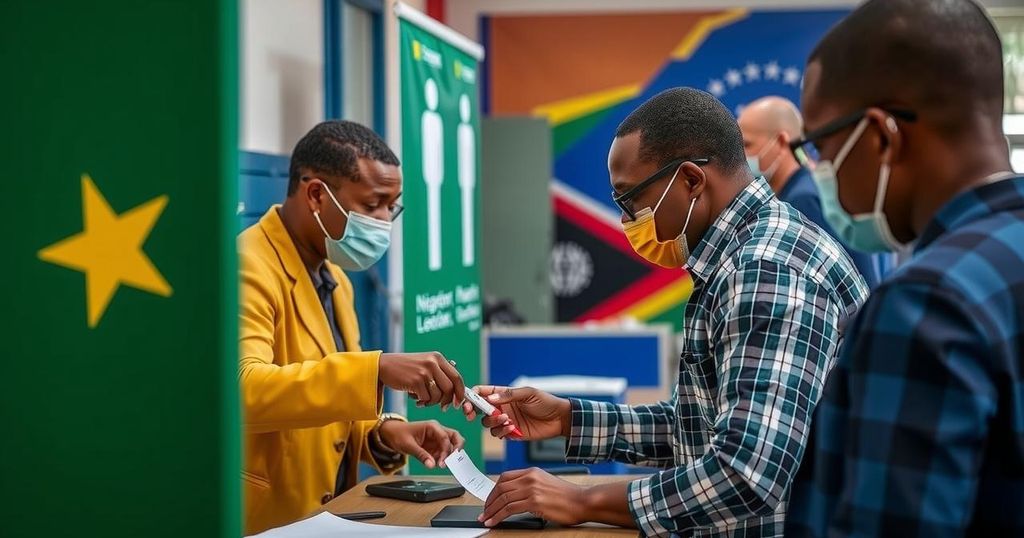Politics
AFRICA, ASSOCIATED PRESS, CENTER, DEMOCRACY, ELECTORAL COMMISSION OF NAMIBIA, ELSIE NGHIKEMBUA, FRELIMO, GOVERNANCE, GOVERNMENT, MOZAMBIQUE, NAMIBIA, NANGOMBE SHITALENI, NET, NETUMBO NANDI - NDAITWAH, NORTH AMERICA, OKANDJENGEDI, OPPOSITION, POLITICS, SWAP, SWAPO, UNITED STATES, WINDHOEK
Isaac Bennett
0 Comments
Namibia Extends Election Voting Amid Allegations of Fraud and Logistical Challenges
Namibia has extended voting for the presidential and parliamentary elections due to ballot paper shortages, facing accusations of fraud from the opposition. Long lines at polling stations and logistical issues have created voter uncertainty. Vice President Netumbo Nandi-Ndaitwah aims to be the first female leader in a nation confronting economic frustration among its youth, against a backdrop of historical political dominance by SWAPO.
Namibia’s electoral authority announced an extension of the voting period for the presidential and parliamentary elections due to unforeseen technical difficulties, particularly related to a shortage of ballot papers. Originally scheduled to conclude on Wednesday, polling stations will now remain open until Saturday night, leading to accusations of illegality from the main opposition party, the Independent Patriots for Change. They assert that these measures indicate potential electoral fraud, further complicating the election process in a nation already facing regional instability from similar allegations in Mozambique.
Vice President Netumbo Nandi-Ndaitwah, who is standing as the ruling SWAPO party’s candidate, aspires to be Namibia’s first female leader. However, she encounters significant resistance from a disillusioned electorate frustrated by economic opportunities in a country perceived as wealthy yet marked by stark inequality. Voter turnout has been hampered by logistical challenges, including the unavailability of ballot papers at various rural stations. Reports indicate that many citizens remain unsure of their ability to vote, with long lines stretching at polling locations across the country.
About 1.4 million Namibians are eligible to vote, influencing government leadership for the next five years. Namibia’s historical context as a former German colony, later administered by South Africa, and its experience under apartheid have shaped its political landscape. SWAPO’s dominance since independence in 1990 has faced increasing scrutiny due to high unemployment rates and persistent economic difficulties, particularly among the youth. This recent unrest in Namibia reflects a broader trend of voter discontent across southern Africa, where long-standing parties are losing support to newer movements that promise change.
The current electoral situation in Namibia is significant, as it comes during a time when the country is grappling with challenges related to governance, economic disparity, and public discontent. Namibia’s political history, shaped by colonialism and apartheid, has produced a dominant party system led by SWAPO since independence. Despite past elections being free and fair, economic struggles, especially among younger demographics, have led to increasing demands for accountability and change. This context highlights the importance of the ongoing elections, not only for Namibia’s future but also for the southern African region at large.
In summary, Namibia’s decision to extend the election voting period in response to technical issues has ignited controversy and allegations of fraud from opposition parties. This situation underscores the country’s historical challenges, including economic disparities and youth disenchantment, as well as its ongoing struggle to ensure a fair electoral process. The outcome of these elections will have significant implications for Namibia’s political landscape and social stability moving forward.
Original Source: abcnews.go.com




Post Comment